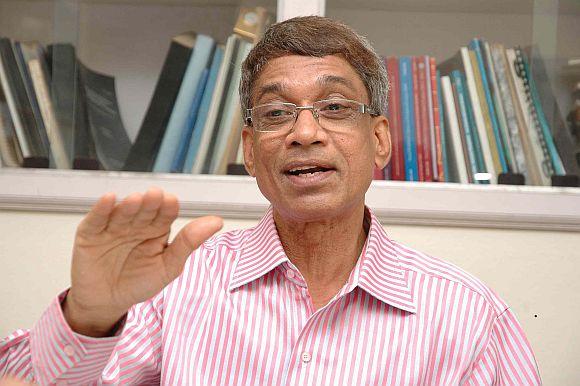
Dr S Janakarajan is a professor at the Madras Institute of Development Studies who specialises in agrarian institutions, interlinked agrarian markets, water management, water conflicts, stakeholder analysis and multi-stakeholder dialogues, environment, urban and peri-urban issues, disaster management and livelihood resilience.
After the Mullaperiyar dam row, Prof Janakarajan along with K J Joy, Suhas Paranjape and A Latha sent a letter to Prime Minister Manmohan Singh with suggestions on how to solve the problem on behalf of For Forum for Policy Dialogue on Water Conflicts in India.
In this interview with Rediff.com's Shobha Warrier, Prof Janakarajan speaks about the win-win situation for both Tamil Nadu and Kerala while strongly maintaining that a new dam will be an environmental disaster.
You along with three others wrote a letter to the prime minister regarding the Mullaperiyar dam. In the letter, you have written that a new dam should not be built. Is it because a new dam will affect the Tiger reserve and also cause damage to the environment?
I have been studying this issue for quite sometime, and I have always been of the opinion that a new dam is not the solution to the Mullaperiyar issue. Even otherwise also, I am against big dams as they can create ecological damage.
Moreover, all reservoirs have their own life span: 40 years, 50 years, etc. The silt accumulation is huge as years go by. Many big reservoirs such as Bhakra, Hirakud have lost their storage capacity by 30 to 40 per cent. It's the same case in Mullaperiyar. And, even if you construct a new dam, it is not going to last forever.
Western Ghat is ecologically a very sensitive zone. Yes, there is a tiger reserve and it is an extremely bad idea to build a dam that will submerge it.
Please ...
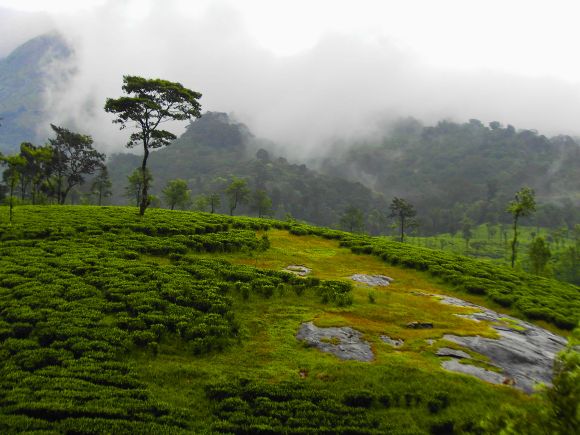
What kind of ecological damage a new dam can cause to the Western Ghats?
When there is going to be a new dam, its direct consequence is going to be more deforestation. In Western Ghats, you find some of the rare species of plants which you don't find anywhere else. Nobody has yet studied the Western Ghats fully. It is a beauty and the lung space for a country like India and it has to be preserved not only for the present but for the future generation too.
You don't have such a space anywhere in India and when you have something like this, you should not destroy it. It is like the Mangroves of West Bengal and Bangladesh which is a lung space for the entire South Asia.
Any construction such as a new dam will also affect the wild life of the area. Some of the rare species of animals, particularly the tigers, will get affected. It is in this context that I said, we must not disturb the ecologically sensitive Western Ghats by building a new dam, and it is not a solution to the much vexed problem.
In the letter to the PM, you have suggested short term and long term plans. As a short term plan, you have suggested that you should keep the water level of the dam at 120 feet or below. Why did you say so?
We can envisage short term, medium term and long term plans for Mullaperiyar. As a short term plan, we suggested to reduce the water level to 120 feet. This is what the Kerala government also wants.
When you reduce the water level to 120 feet, it cannot any more be a big storage reservoir. It will only be a diversion weir. When it is a diversion weir, it will no longer occupy a big water spread area which is to the benefit of Kerala. Water at the moment is diverted to Tamil Nadu at 105 or 106 feet and that can go on but water drawn from Mullaperiyar could be stored in the Tamil Nadu territory by constructing a series of balancing reservoirs and in the Vaigai dam.
This way, the damage to the ecology can be minimised. This way, Tamil Nadu can draw water as much as they would draw at 152 feet level. In this method, water will always be in transit at Mullaperiyar.
That means, there has to be storage spaces in Tamil Nadu and that needs to be identified. This warrants for a hydrological surveys and studies.

How would Tamil Nadu react to the suggestion?
I really do not know. They take the extreme position of no new dam, and at the same time insist on maintaining the water level at 142 feet. On the other hand, Kerala's extreme position is that only the new dam can solve the problem safety. If both the parties are going to stick to their extreme position, there is not going to be a solution.
You mean the Mullaperiyar dam should only be a diversion dam and not a storage dam?
You cannot call it a diversion dam but a diversion weir. Dam stores water but a weir only diverts water. This way, water storage is dispersed. Some water will be stored at Mullaperiyar at 120 feet and some in the series of small water reservoirs, some in the Vaigai dam and some will be used constantly.
What are the long term plans you would suggest?
Western Ghats is not the property of any one state. Kerala, Tamil Nadu and Karnataka should get together and give priority to maintain the ecology of the Western Ghats. In the case of Tamil Nadu, it should identify water sheds and harness water to augment its water supply.
What about the reported seismic activity in the area?
I am not an expert in that area, so cannot comment on that. But the latest report by the committee headed by Justice Anand says that seismic activity has not affected the dam. But I do maintain that seismic activity might not have affected now, but it could affect tomorrow. Nobody can give any guarantee. But as of now, it has not affected the dam. Experts say that it is a seismic zone.
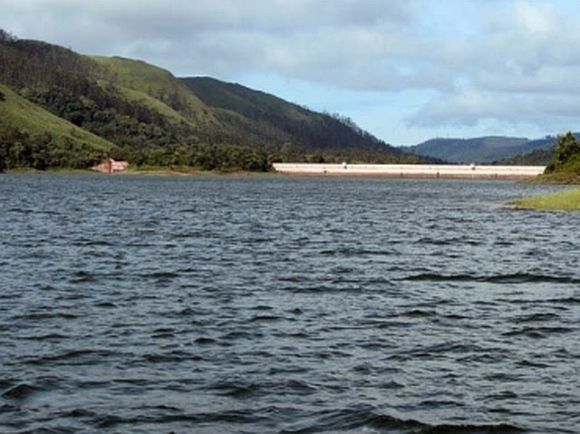
Won't there be a limit to the life span of a dam?
Absolutely, there is a time limit. Today, Tamil Nadu says the dam is safe. Fine. I don't challenge that, but tomorrow there is no guarantee. Every structure, whether it is a dam or a building, has got its own life span. Therefore, it is high time, we think of an alternative. And it should be in the best interest of both the states.
Solution is not a new dam as the same problems can occur to the new one as well. We don't want one more dam and the same old argument again. We are also against the ecological damage it can cause.
Moreover, diversion weirs can last long. The Grand Anicut (built on the Kaveri in Tamil Nadu) constructed in 2nd AD is still there. In the case of Mullaperiyar, it's a dam. But the Grand Anicut, which is a diversion weir has lasted for over two thousand years.
That is one argument Tamil Nadu is using all the time, and comparing it to Mullaperiyar...
No, The Grand Anicut is not a dam, it's only a diversion weir. That is why we are suggesting, if Mullaperiyar can be modified to a diversion weir, it will last for a much longer time.
As an expert, how do you look at the water conflicts between various states like Tamil Nadu and Karnataka, Tamil Nadu and Andhra and now, Tamil Nadu and Kerala? Is interlinking the rivers an answer to these conflicts?
Interlinking of rivers is not the solution; it is ecologically unsound and unwise. It will result in more conflicts than resolving the issue. It is a very bad idea.
Why do you say it is a bad idea?
It is ecologically unsound. In the case of Mahanadi in Odisha (as in the case of peninsular river link) significant part of the surplus water is available only in closer proximity to the sea, say at a distance of 50-60 km from the sea. Only if surplus water is available in the upstream, it can be diverted to other basins. Otherwise, I cannot understand how one can pump water from downstream to upstream.
Also, you find surplus water during monsoon months everywhere. In Mahanadi, for instance, there is a huge flow during the monsoon months. Moreover, unless you create another river like canal, diversion of water from one basin to another is not possible.
The idea of river linking is an extremely myopic. I have a huge data base to show that this will create more problems. Eight to nine years ago, it was estimated that interlinking of rivers may cost Rs 5.5 lakh crores. Today, the cost may be Rs 10-12 lakh crores. Even if you allocate 10 per cent of the total cost of the project for annual maintenance, it will cost the government a huge sum of Rs 1 lakh crores. Where is that kind of money available? So, you will create huge assets but never maintain it. This is only the engineering part of it. There are also a good number of socio-economic, environmental and ecological issues involved in the river linking project.
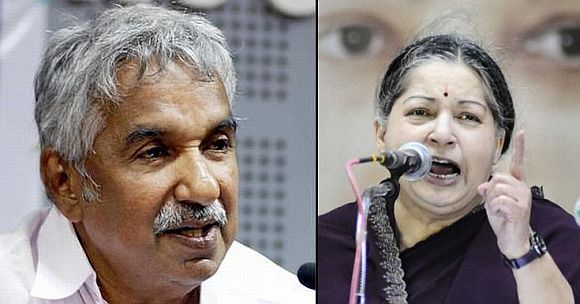
As a person who has written a lot on water conflicts, would you say it will be there as long as humankind is there?
Actually, water conflicts are not bad idea. Conflict should be looked at as a source of change and source of opportunity. It should be looked at positively.
What do you see positive in it?
In the case of Mullaperiyar, because the conflict took place, people in Kerala have the fear of the dam breaking, and people in Tamil Nadu fear about losing water for their livelihood. So, this is an opportunity to think about how to manage water.
The dam is 116 years old. If not today, in another 10 years time, this fear will crop up.
So, think about a win-win situation for both the states. Think positively about the preserving the ecology of the Western Ghats; think of serious aforestation programme to sustain and to increase the rainfall; identify new watersheds to augment water supply, etc.. Therefore, I like to look at water conflicts positively.
But now, because of the water conflict, these two states are fighting like enemies...
What we suggest is a win-win situation for both the states. After all, Kerala and Tamil Nadu are highly interdependent socially, culturally and economically. How many tonnes of vegetables, fruits and flowers go from Tamil Nadu to Kerala! And they depend upon Tamil Nadu for their food grains and vegetables.
Similarly, for Tamil Nadu, it is a huge market for all that is produced in that state. They are interdependent and not one is dependant on another.
Culturally also, they are interdependent. How many thousands go to Sabarimala? How many come to Madurai Meenakshi temple and Pazhani?
Food habits and languages are almost the same. They intermarry. It is a part of Dravidian culture.
That is why I say, the present conflict is not sustainable and not in the interests of both the states.
In your letter to the PM, it is written that the intense fear and insecurity amongst thousands of downstream people over the safety of the dam needs to be taken seriously and initiate measures immediately to address this. Do you feel their fears have been ignored?
Absolutely. There is a mixed opinion about the safety of the dam. My opinion is, whether the dam is safe or unsafe, it is high time we think and rethink or revisit our opinions. It may be safe today but nobody knows what happens tomorrow.
I visited the Vandiperiyar and Kumili region. I could see that the people are in utter fear. Children even refuse to go to school during monsoon months fearing that they may lose their parents or that they be washed away when they are in school.
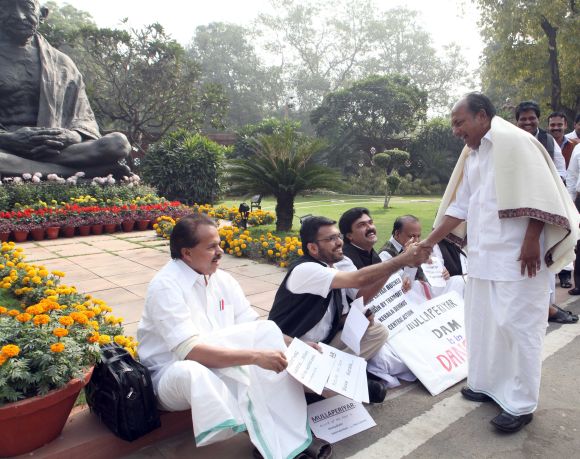
Do you feel politicians are creating panic in the minds of people living in that area?
Yes, absolutely, but the damage already has been done. It is too late to undo the damage. Political parties in Kerala have done the maximum damage. They shouldn't have done this. Now, people of the region do not even sleep. Fear psychosis has been built in the minds.
In the letter, you have mentioned about a tripartite panel consisting of both the states and the Centre. What exactly do you mean by the tripartite panel?
It is a panel of members from civil society. They can be real opinion makers. By and large, people agree with our solution. Many people who think that nature is very important agree with us that one more dam is not the solution. Justice V R Krishna Iyer is in agreement with our suggestion, and he has also written to the PM quoting from our letter.
Are the politicians willing to listen to your suggestion?
Except the civil society, we have not got any support from any political party from either of the states. We have also not spoken to any political party. Except that I met (Communist Party of India-Marxist politburo member) Sitaram Yechury when I was travelling and spoke to him about this very briefly. He said it was a wise idea and asked me to send it to him. I send him the letter that we wrote to the PM, but have not heard from him yet.
Any response from the Prime Minister's Office?
So far, no.
How do you plan to make your suggestions heard?
I started the Cauvery Family in 2003 involving leading farmers leaders from both the states and have held 18 very fruitful meetings so far. We are even very close to the water sharing formula agreeable to both parties. But we are stuck because we do not have the political patronage.
Like what I did in the case of Cauvery water dispute, the forum is planning to bring together members of the civil society and stakeholders from both states for a meaningful dialogue.